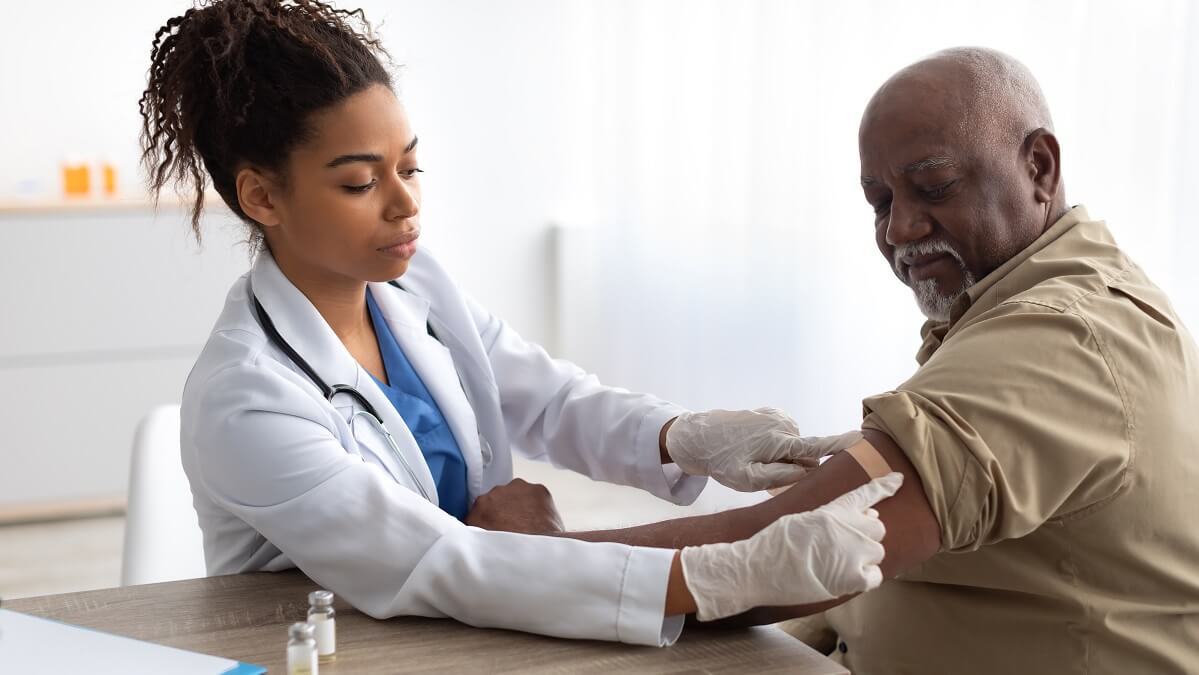A vaccine for respiratory syncytial virus (RSV) has been approved by the Therapeutic Goods Administration (TGA) and will be available through private prescriptions for those 60 and above “very soon”.
Approved for use by the TGA on 8 January, AREXVY is a protein-based vaccine for the prevention of lower respiratory tract disease caused by RSV, which can be fatal.
The GlaxoSmithKline vaccine was approved for use in those over 60 by the US Food and Drug Administration in May 2023.
Adelaide grandmother Lisa Loader contracted RSV in August 2022, after caring for her three-year-old grandson, and said she thought she was going to die.
“It was the first time I thought about my own mortality,” she said.
The 59-year-old retiree, who also lives with asthma, described it as the “most scary, horrible” illness she had ever experienced.
“I stayed up for two nights, terrified I was going to die … I’d rather have COVID 10 times over,” she said.
The virus rapidly progressed into a serious case of bilateral pneumonia and she lost her voice for weeks.
Ms Loader said it took months to recover, and she still experiences shortness of breath 18 months on.
“Eleven weeks is a long time to be bedridden and not able to go out and enjoy your social life,” she said.
What is RSV?
RSV causes respiratory infections and is one of about 200 viruses that can cause a cold.
Most cases are mild, but RSV can lead to serious illness in young children, the elderly and people with immunosuppressive conditions.
Contracting the virus can lead to chest infections such as bronchiolitis and pneumonia, and can also cause ear infections.
The coughing associated with the illness can worsen asthma symptoms.
Last year, cases of RSV skyrocketed across the country, with some states reporting close to 10 times the number of cases compared to the same time in 2022.
Dr Anita Sharma, a Brisbane-based general practitioner, said the virus was spread through contact with droplets from infected people coughing or sneezing, or from touching surfaces contaminated by the virus.
While most cases are mild, Dr Sharma said illness could become serious for some people.
“RSV infection can be a serious infection for patients above the age of 60, [or] those with co-morbidities like diabetes, heart failure or COPD [chronic obstructive pulmonary disease], and this seriousness can translate to them suffering bronchitis, pneumonia or being very sick and requiring hospitalisation, or even ICU admission,” she said.
Dr Sharma said potential side-effects from the vaccine included local reactions such as redness, soreness, swelling and low-grade fever.
Vaccine soon to be available for some Australians
AREXVY is the first RSV vaccine approved by the TGA in Australia, and is a non-live vaccine that works by boosting patients’ immune response to the virus.
It will be available to people over 60, initially via private prescription.
University of South Australia epidemiologist Adrian Esterman said it would be greatly beneficial in helping prevent serious infections.
“This particular vaccine is something like 90 per cent effective at reducing serious lung disease in elderly people, and we’re getting an older and older population,” he said.
“It works by basically blocking the virus’s ability to latch onto ourselves.”
Professor Esterman said he hoped a separate RSV vaccine approved in the US for pregnant women would also be made available, to provide newborn babies with protection.
“RSV is incredibly common, and in fact almost all kids would have been infected before the age of two, and for the vast majority of those kids it’s just a normal common cold,” he said.
“[But] a small number get very, very sick and end up in the hospital.
“It’s a very common reason why young kids go into hospital, but if you give the vaccine to the pregnant mum, that does protect them.”
GP and Immunisation Coalition chairman Rodney Pearce said he saw cases of RSV in his practice everyday, and there was not any treatment available for the virus.
“To prevent it or decrease its spread is a major step forward,” Dr Pearce said.
“All of the follow-on diseases it causes, all of the carnage it causes, we can now actually do something about it.”
He said he hoped it would eventually be made available to other at-risk groups and help prevent co-morbidities.
“There’s an association with RSV and asthma, so we think we might actually prevent asthma by stopping people getting RSV and eventually decrease the amount of asthma we see,” he said.
He said he was confident the vaccine would also reduce RSV-associated hospitalisations.
Pharma company working on supply
A spokesperson for GlaxoSmithKline said it could not detail the cost of a private prescription, but was working to secure supply and said it would be available for eligible patients “very soon”.
The spokesperson said the company was applying to have the vaccine included in the National Immunisation Program (NIP).
A Department of Health spokesperson said vaccines could only be provided free under the NIP after the Pharmaceutical Benefits Advisory Committee (PBAC) made a positive recommendation for its inclusion.
The PBAC considers the disease, the clinical effectiveness of the vaccine, safety, and cost-effectiveness.
If a vaccine is recommended by the PBAC for NIP listing, the government will then consider the inclusion of the vaccine on the NIP.
The Department of Health spokesperson said the PBAC was yet to receive a submission for AREXVY.
Lisa Loader said she would be getting vaccinated as soon as possible.
“Because you never know how bad you’re going to get it,” she said.
“You might get a mild dose, or you might get it like I did and be really scared and really sick.”
 © 2020 Australian Broadcasting Corporation. All rights reserved.
© 2020 Australian Broadcasting Corporation. All rights reserved.
ABC Content Disclaimer

